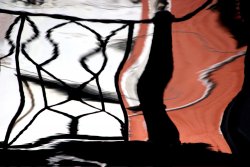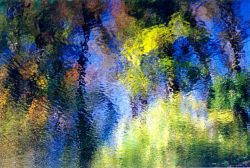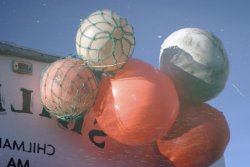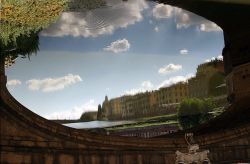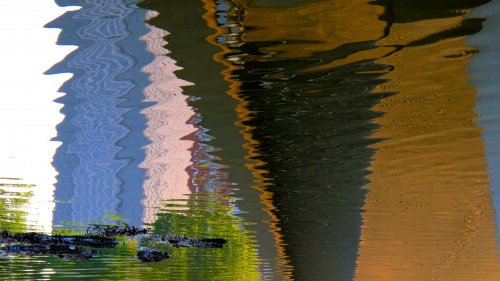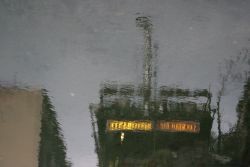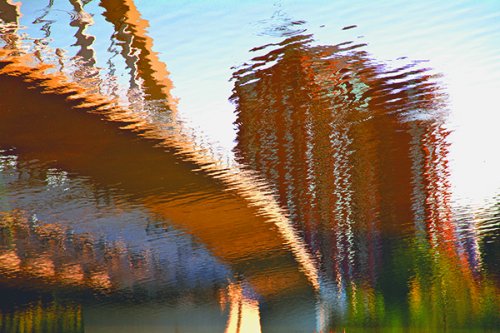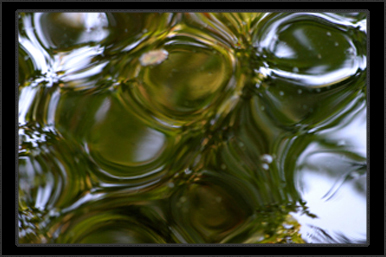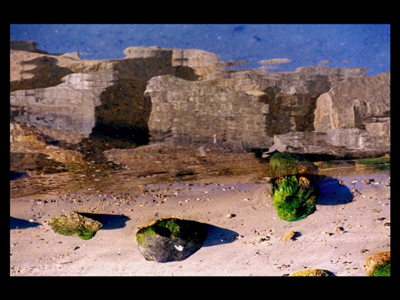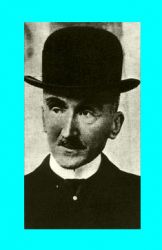Bruce Nauman: My imaginary doppelganger
March 07, 2011 - View Single Entry
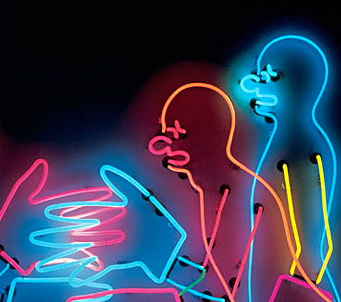
By Bruce Nauman Bruce Nauman is my imaginary doppelganger. We speak in the same tongue. It's uncanny to me. And how do you do?
Visual Sound Proof
December 28, 2007 - View Single Entry
This image elicits no sound
and I think I know why:
because all the edges are sealed.
Not even sound can escape.
Power in Periphery
December 16, 2006 - View Single Entry
In
a dream, I was playing the piano, using this image as written music.
The picture was seated on a music stand on my left. I could easily play
the shape of the mountains as long as I viewed the image in peripheral
vision, but as soon as I turned my head to look at it directly, I lost
my power and it turned back into a picture. Is it possible that in
order for synesthesia to take place, one must not be overly focused?
And if so, isnít it ironic that one must be in a partial state of
unawareness in order to be the most aware?
Behind the Symbols: Layers of Thought
May 18, 2006 - View Single Entry
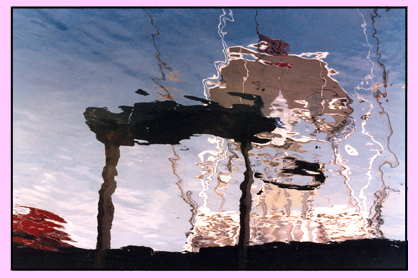
This image perfectly represents what a layered thought looks like to
me. When I see a word, or a symbol, or an icon, or a number, I
see an additional version or layer of meaning behind it, and I mean
that quite literally. I see a second or third version of the visible,
though I "know" what I am looking at isn't "see-able" to other people.
(At least, I know that as an adult.) In this image, the dark shape in
front represents the visible while the white shape behind is equivalent
to the version I view automatically on the otherside of consciousness.
Even as I look at the additional layer, I understand that it is
generated from the object in front of it. That's the reason the edges
are indistinct and the shape is amorphous, much like the nature of
meaning itself.
Pictures from the Cave . . . A Mobius Strip
May 14, 2006 - View Single Entry
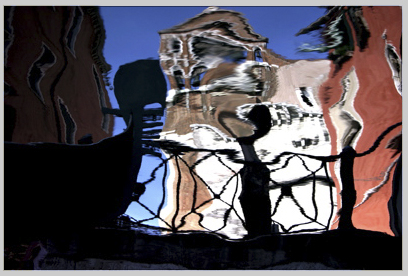
I was once sent
to a researcher in light therapy because I had a sudden depression no
one could explain. My doctor was trying to
determine if light therapy would help. He attached a computer to my wrist
which I wore for 3 days and 3 nights. It measured my
Circadian rhythms. After reviewing the results, he concluded that light
would do me no good.
"The problem," he explained, "is that you have the Circadian clock of a cavewoman."
Not knowing if this was good or bad, I naturally asked him to
explain. He told me that I have a 26.5 hour day and that aside from
that, I am impervious to my environment. So, tonight
I had a revelation: if synesthesia stems
from the oldest part of the brain, doesn't it make sense that it would
show up in the mind of a cavewoman? Further, if it is also true that
in evolutionary terms, synesthetes represent the future, doesn't that
make sense too, since time is circular?
He was wrong about light, by the way. As it turned out, I used reflected light to cure my
depression. I discovered that by looking at reflections, I could travel
out of my feelings. Of course, I didn't
realize that I wasn't actually going anywhere. Nor could I see that my emotional life
was the underside of a Mobius Strip I'd managed to flip over, by viewing
the world upside down. From that angle, I could spot the necessary shapes into which I poured my
inchoate feelings. And by the time I developed the pictures, the emotional shapes had gelled.
Mirrors and Molecules . . . Bucky Balls and Consciousness
April 15, 2006 - View Single Entry

Self-Portrait
To me, a Bucky Ball is the perfect
self-portrait and ideal symbol for the self. When I look at this
picture, I feel like I
am looking in a mirror. This is why: I see the orb in the center as my
"self" while each polygon is a double-sided portal that allows
information to travel back and forth between myself and the world. The
polygons are like sensors (as well as censors), some of which are open,
some of which are shut, some of which are sealed. I further picture the
whole thing orbiting not in space but in time. As each has its
turn in n-o-w, it may be open, shut or sealed. Thus, they act as
transoms that let information in and
out of consciousness. How many are open? It varies from person to person. But the number -- if indeed they
are amenable to counting -- is vastly higher than the usual 5 attributed
to the senses in
western culture. Furthermore, I suspect that they operate in
realms that have nothing to do with sense but everything to do with
sensibility.
The picture of the Bucky Ball is from a site in Germany
Musing on My Memory
April 04, 2006 - View Single Entry
When I was growing up, my nickname was
ďThe Memory BankĒ because I remember not only everything that has
happened in my own life but also everything that has happened in the
lives of my friends -- even if I was not present but only heard about
it. Debby, my best friend from childhood, will call to ask me for a
specific detail of an event from her life that happened 40 years ago.
She knows that if she told me about it at the time, I will be able to
repeat it to her exactly as she said it then.
Why can I do this and
what does it mean?
Itís hard to explain how normal this feels to me. I
have never thought of this ability as a sign of intelligence since no
effort goes into remembering whatsoever. It is just there, as if my
memory is a tar pit that preserves whatever falls into it. Once I know
it, I cannot not know it: if I own the memory once, I own it for all
time. I sometimes think the birth of the self begins with the first
memory since it is the first possession.
How I learned to ride a bike
March 16, 2006 - View Single Entry
The way I learned to ride a bike is that I dreamed it first. This
was after several months of training wheels followed by a few failed
attempts of going up-and-down the drive on my blue girl's Schwinn, my
father's hand resting on the back of my seat to balance me so I would
not fall.
"Not yet, not yet!" is the only thing I remember saying,
which meant, "Whatever you do, Dad, please don't let go, I'm not ready
yet." What was balance anyway, I wondered, how could I possibly learn
to
suspend myself on moving wheels? I despaired I would ever be able to
ride a two-wheeled vehicle when that night, I dreamed I could.
It is one of those dreams that I remember still in detail. The
image that floats to mind first when I think of it is a wet portrait of me in-motion painted
in pastels: but the key is in what I am feeling in the dream, the
sensation of balancing as I ride my bike in the dream.
It was so strong
a feeling -- so convincing a "fact" -- that when I woke up the next day, I
ran downstairs, jumped on my "real" bike, and rode all over town. I never
experienced fear or hesitation again because I had already succeeded in my dream and remembered how it felt.
Proton and Neutron
February 23, 2006 - View Single Entry
 Hoops by M. Smilack
Hoops by M. Smilack
I took the picture above in Amsterdam a few years ago. Then, the
other night while surfing the internet, I unexpectedly came upon the
image below. I found their
resemblance uncanny. Yet, the picture below is the plotting of electric
fields of
positive and negative particles; the image above is a reflection of a
bridge on a Dutch canal. What does this mean? Is it evidence that
universal shapes recur in Nature and Art? I can only tell you this:
that at the moment I
saw the picture below, I felt the gestalt of recognition from having
seen the same shapes on the water.
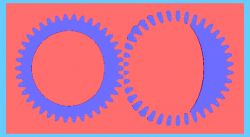 Deuterium by Arden Barker Deuterium by Arden Barker
Music and Math
February 06, 2006 - View Single Entry

Music is the pleasure the human mind experiences from counting without being aware that it is counting - G. Wilhelm Leibniz
Recurring Shapes
January 08, 2006 - View Single Entry
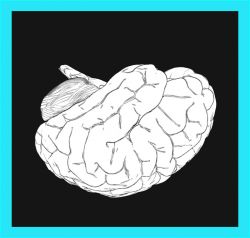
When I look at a picture of a brain --
before I have time to "think" or recognize what I'm actually looking at
-- I see a person in a fetal position. Only secondarily, do I realize
that it is also a picture of a brain. So I have a question: is this
recurring shape an accident of Nature or is it the ultimate example of
good design? I love when Nature puts forth its own symbols. I don't
believe in accidents.
Portals of Consciousness
December 28, 2005 - View Single Entry
In reality, the past is preserved by
itself automatically. In its entirety, probably, it follows us at every
instant; all that we have felt, thought and willed from our earliest
infancy is there, leaning over the present which is about to join it,
pressing against the portals of consciousness that would fain leave it
outside.
by Henri Bergson in Creative Evolution, 1907
|
